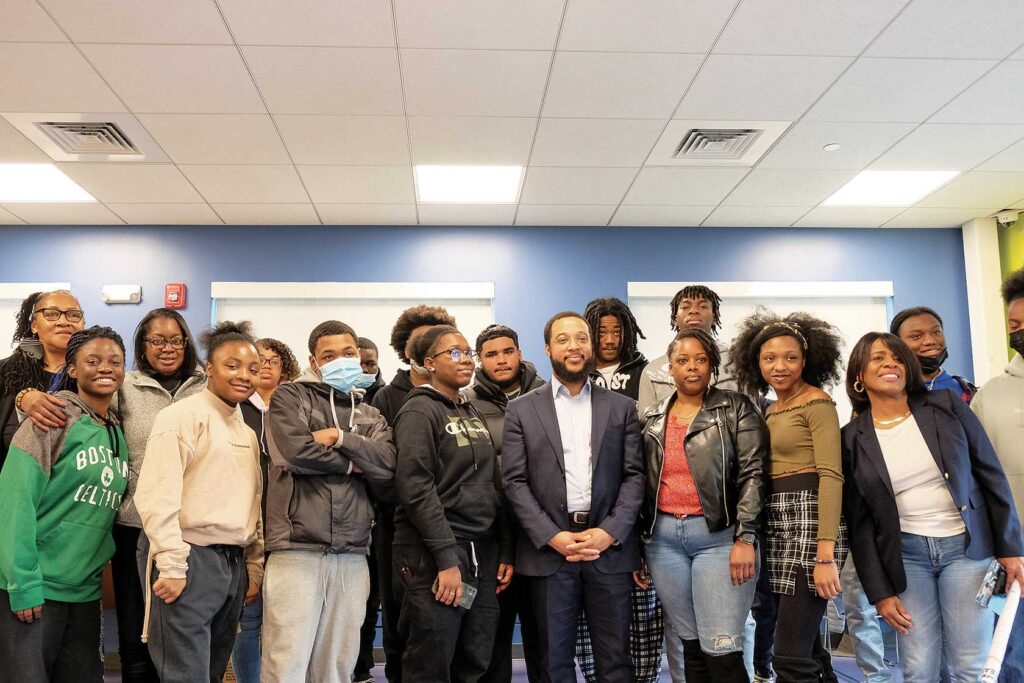
Faith Archibald, a third-year high school student from Roxbury, watches how she spends money.
Earlier this year, she began taking classes at Marcus Anthony Hall Educational Institute, a Lower Roxbury initiative that offers a program called “Money! Money! Money!” that encourages high school students to think seriously about saving, spending and managing money.
The 14-week program focuses on students from low-income communities and teaches participants ages 14 to 20 about managing bank accounts, with a broader understanding on economics in their community and the world. Participants attend local high schools and are paid a small stipend for being in the program.
Issues around closing the wealth gap have been gaining steam in the city, particularly in low-income communities, and efforts are underway to target young people early to think seriously about their financial health. It’s one of the reasons the institute developed the weekly program, held Saturdays at The Dewitt Center, organizers said.
During their weekly sessions, students learn how to open and manage bank accounts, save money for the future and develop strategies for building wealth in their communities.
“We know that college isn’t for everyone, but we’re seeing with this cohort a lot of our students do want to go to college, so we want to try to help them do that,” said Corrine Kelton, a retired Massachusetts social worker and vice chair of the Institute’s board.
She said Marcus Anthony Hall Educational Institute’s mission is to uplift young people in the city, including those who have difficulties staying in school or dealing with family crises. The institute aims to offer “a space where they can be a part of their own community and interact with their peers,” she said.
Yashane Williams, a junior at Cathedral High School, said he is participating in the program because his school does not have a similar course. “This class is helping a lot with [us] because not a lot of people know about this stuff,” Williams said. “This class is helping spread awareness to the children about the things that they should know.”
On a recent Saturday, guest speaker Segun Idowu, the city of Boston’s chief of economic opportunity and inclusion, discussed students’ studies and money management. He also encouraged them to think early about going into business.
“When I graduated from Boston Latin Academy, I had a 1.9 GPA,” said Idowu, encouraging students to not give up. “I don’t tell too many people [about my GPA], because I’m sure they’re scared, now that I’m in this job, but I just want to let you know that your GPA does not define who you are.”
He highlighted the value of business in the Black community. Though Black residents make up a quarter of the city’s population, Idowu said, more than 90 percent of spending in Boston goes to non-Black and brown businesses.
Ivonna Douglas, a student in the class, said, “When I see people of my color trying to sell something, get something out there, even if I haven’t seen it before, I’ll just buy it just to support [it].”
Archibald told Idowu she wants to open a clothing store one day, and Idowu urged her to come to the city for assistance. “We’re here to help you do that,” he said.
Dayvianna Mays, a first-year student at Fenway High School, said that for her, the program is a good opportunity, especially because she is getting paid for her time.
“I’m not very confident when it comes to my financial literacy. I’m definitely very good at saving, but I don’t spend that much money at all,” Mays said. She got to know the program from her sister, her “role model,” who works in the Office of Police Accountability and Transparency.
Mays said she has attended a couple classes, but she hasn’t gone as much as she wants to because the classes are on weekends when she has debate tournaments at her high school.
“In debate, we talk about politics, and it largely has to do with inequality,” Mays said. “That’s largely what I want to get into when I grow up.”
Idowu encouraged the students to think of the African American community as “part of a bed of roses, not as the rose out of concrete.”
“I actually don’t accept the narrative that Black folk live in poverty,’’ he said. “It’s not true. In Boston, Black people are wealthier than what the news will tell you.”
The program continues through May, when there will be a graduation. Organizers said they are fundraising to increase the stipend for students.
This story was published as part of a collaboration with Boston University’s School of Journalism in the College of Communication. The student journalist is a member of a Reporting in Depth class taught by former Boston Globe reporter Meghan Irons.






